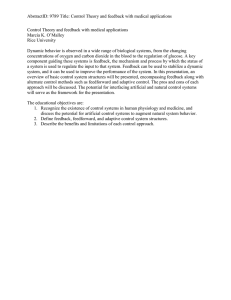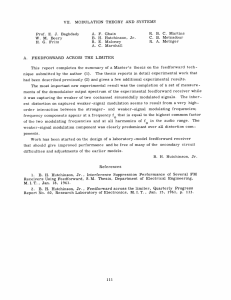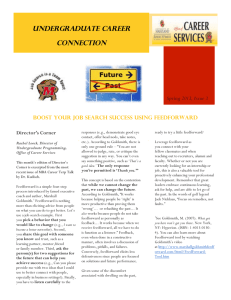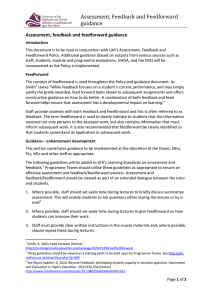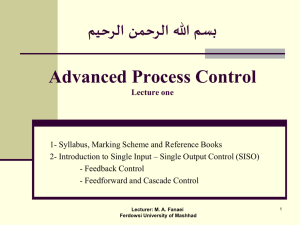university of stirling policy on feedback and feedforward
advertisement
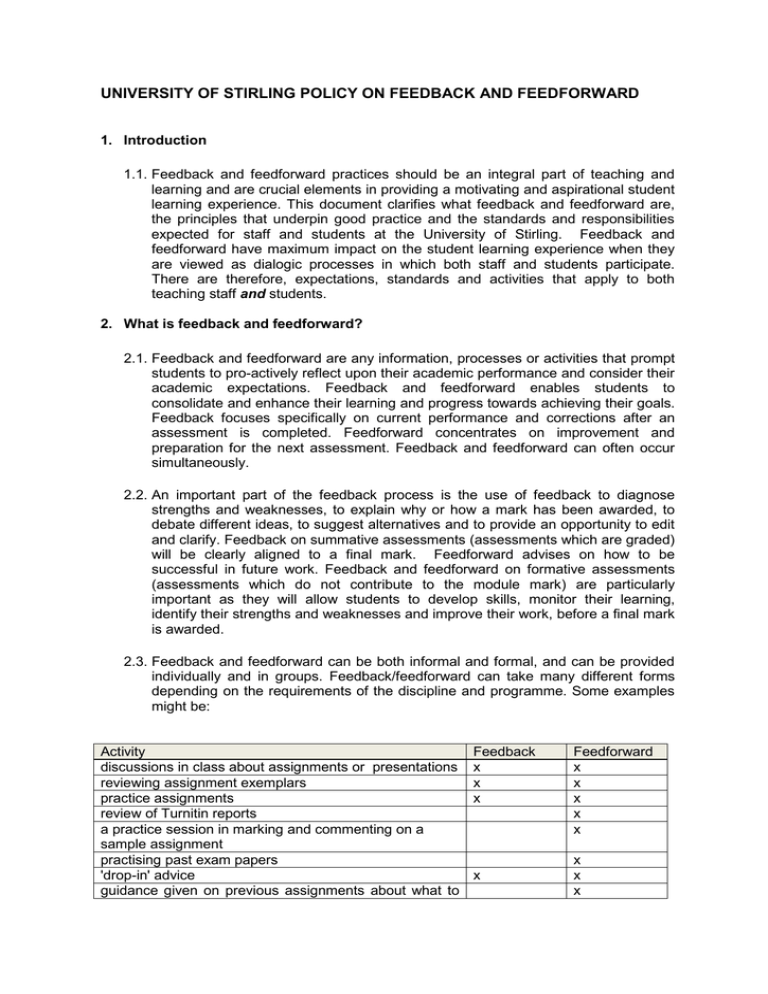
UNIVERSITY OF STIRLING POLICY ON FEEDBACK AND FEEDFORWARD 1. Introduction 1.1. Feedback and feedforward practices should be an integral part of teaching and learning and are crucial elements in providing a motivating and aspirational student learning experience. This document clarifies what feedback and feedforward are, the principles that underpin good practice and the standards and responsibilities expected for staff and students at the University of Stirling. Feedback and feedforward have maximum impact on the student learning experience when they are viewed as dialogic processes in which both staff and students participate. There are therefore, expectations, standards and activities that apply to both teaching staff and students. 2. What is feedback and feedforward? 2.1. Feedback and feedforward are any information, processes or activities that prompt students to pro-actively reflect upon their academic performance and consider their academic expectations. Feedback and feedforward enables students to consolidate and enhance their learning and progress towards achieving their goals. Feedback focuses specifically on current performance and corrections after an assessment is completed. Feedforward concentrates on improvement and preparation for the next assessment. Feedback and feedforward can often occur simultaneously. 2.2. An important part of the feedback process is the use of feedback to diagnose strengths and weaknesses, to explain why or how a mark has been awarded, to debate different ideas, to suggest alternatives and to provide an opportunity to edit and clarify. Feedback on summative assessments (assessments which are graded) will be clearly aligned to a final mark. Feedforward advises on how to be successful in future work. Feedback and feedforward on formative assessments (assessments which do not contribute to the module mark) are particularly important as they will allow students to develop skills, monitor their learning, identify their strengths and weaknesses and improve their work, before a final mark is awarded. 2.3. Feedback and feedforward can be both informal and formal, and can be provided individually and in groups. Feedback/feedforward can take many different forms depending on the requirements of the discipline and programme. Some examples might be: Activity discussions in class about assignments or presentations reviewing assignment exemplars practice assignments review of Turnitin reports a practice session in marking and commenting on a sample assignment practising past exam papers 'drop-in' advice guidance given on previous assignments about what to Feedback x x x x Feedforward x x x x x x x x change in future comments from staff or other students reflective writing and action planning discussions in supervision meetings reflections in learning journals on academic/professional experiences handwritten notes in the margins of an assignment ratings on a marking grid verbal or emailed comments from staff or other students 'clicker' responses in a lecture a debriefing by a professional practitioner or mentor whole-class or 'generic' feedback on how an exam question had been tackled final marks or awards x x x x x x x x x x x x x x 3. Why is feedback/feedforward important? 3.1. The purpose of feedback/feedforward is to encourage reflection so that both students and staff can identify the next steps in learning in order to improve their future work. Good feedback will clarify expectations, indicate what ‘good’ performance is and how this might be achieved, and it will allow students and staff to monitor progress. Good feedback will help develop learner autonomy and selfregulation and enable students to put new learning into practice. Staff can use feedback to identify recurring issues and can use feedback to inform and modify their approaches to teaching. 3.2. Feedback is therefore important in supporting the development of skills such as self-assessment, critical appraisal and self-regulated learning; all crucial skills for employability and life-long learning. Being able to evaluate the quality of our own work and the work of others is an essential University of Stirling graduate attribute. Feedback/feedforward also play an important role in encouraging and motivating students in their studies and developing self-esteem. 3.3. From a student perspective, the value of feedback is in how the feedback is interpreted, understood and used. To progress and improve performance, students need to pro-actively engage with all forms of feedback and use the feedback/feedforward to enhance future learning and assignments. 4. Who can give feedback/feedforward? 4.1 There are opportunities to get feedback/feedforward from a wide variety of people. These include: the students' own personal reflections on their work; lecturers; supervisors; tutors; demonstrators; fellow-students; professional practitioners; mentors; an audience in a seminar or at a poster presentation. Anybody who comments on student performance and progress is giving essential guidance. 5. Principles of effective feedback/feedforward: 5.1. Embedded: Feedback and feedforward need to be an integral part of the learning process and so opportunities to give, receive and engage with feedback/feedforward should be embedded within the curriculum and planned across programmes. 5.2. Timely: Students should receive regular feedback throughout their modules. All feedback is useful, but for feedback and feedforward to have most impact, it should be given in good time prior to the submission date of subsequent related assessments. 5.3. Transparent: Good feedback will be directly related to the learning outcomes/assessment criteria/guidelines against which the overall mark is awarded. Use of a marking grid should reflect the mark awarded and additional comments should be provided. 5.4. Goal referenced: Good feedforward would clarify expectations in advance, including what good performance is (e.g. goals, assessment criteria, and expected standards) and how this could be achieved. Good practice would include additional information such as annotated exemplars. Good feedback will provide clear details about the extent to which the outcomes of a piece of work/task have been achieved. 5.5. Dialogic: Good practice will promote teacher/peer discussions around learning and performance. To enhance their learning experience, students need to take the opportunities to pro-actively engage with feedback/feedforward, reflect and act upon it. 5.6. Consistent and accessible: The use of marking pro-formas, agreed assessment criteria and rigorous, recorded moderation procedures will ensure consistent marking between staff. All feedback/feedforward should be delivered in accessible formats. 6. Standards of provision Academic staff It is expected that: 6.1. Academic staff will adopt the principles of effective feedback/feedforward. 6.2. Module documentation will clearly inform students: • • • • • what kinds of feedback/feedforward they can expect; when feedback/feedforward will be delivered; how feedback/feedforward will be communicated; how students are expected to engage with feedback/feedforward and what the student responsibilities are; and details of assessment guidelines, expected standards and assessment criteria. 6.3. Feedback will: • • • • • • be legible, if in writing; be constructive and supportive; identify current strengths; be clearly aligned to the assignment learning outcomes; be clearly aligned to the final mark awarded; clearly identify steps to be taken towards future improvement; and • be appropriate for the level of study. 6.4. Formal feedback on summative assessments will be returned to students: • • using pro-forma feedback cover sheets, where appropriate, to provide comments which are clearly aligned to the assessment criteria; within 3 weeks (if due to exceptional circumstances this is not possible, this should be communicated to students with an explanation and a new return date indicated). 6.5. Academic staff will: • • • • • • • • implement feedback and feedforward strategies across programmes in a systematic way; design modules with opportunities for students to self-assess, peer-assess, receive formal and informal feedback/feedforward and to reflect upon their learning and progress; provide opportunities for discussion before tasks are undertaken, to enable students to understand and interpret the task set and the assessment criteria; ensure that students are given access to university feedback/feedforward guidelines; provide opportunities for students to meet with relevant staff to discuss assignment feedback/feedforward and progress and clearly communicate these arrangements to students; not normally provide individual feedback on examinations. However, general feedback on the overall examination performance of the cohort should be made available; as appropriate, refer students at risk of academic failure to the relevant central services; and regularly reflect upon current feedback/feedforward practices in the sector and review their own approach to feedback. To support this, staff could engage in activities such as moderation processes, sharing good practice and participating in CPD opportunities. 6.6 Schools will: • • implement processes to regularly monitor and maintain the provision and quality of feedback/feedforward practices; and ensure that staff workloads reflect the time associated with providing feedback/feedforward and are sustainable. Students 6.7 Students need to be aware that they also have a significant responsibility for making the best use of the feedback/feedforward they are given. To maximise their learning potential, students need to proactively engage with all types of feedback/feedforward. 6.8 It is expected that students will: • find out where, how and when feedback/feedforward will be provided; • • • • • • engage with feedback/feedforward as an important part of the learning process and understand that all feedback/feedforward is an opportunity to improve performance and achieve their academic goals; read information on feedback/feedforward given in student handbooks/module outlines and University guides; keep a copy of all assignments and collect (or download and save) all feedback sheets; carefully read/listen to all feedback available and take time to identify and reflect upon the strengths and weakness of their learning/work; use feedback to take action, improve, and enhance future learning and subsequent tasks; prior to starting an assignment, carefully note: • • the assignment guidelines; the relevant assessment criteria; any exemplar or other feedforward provided; any relevant regulations and submissions arrangements; and reflect upon the academic expectations of the task pro-actively seek additional advice if they have any questions about assignments and feedback/feedforward. be constructive when offering academic feedback to peers and evaluative feedback to the University.
